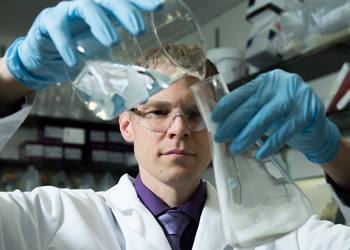 Researchers at Bringham Young Univ. (BYU) have devised a system to speed up the process of making life-saving vaccines for new viruses.
Researchers at Bringham Young Univ. (BYU) have devised a system to speed up the process of making life-saving vaccines for new viruses.
Their concept is to create the biological machinery for vaccine production en masse, put it in a freeze-dried state and stockpile it around the country. Then, when a new virus hits, labs can simply add water to a “kit” to rapidly produce vaccines.
“You could just pull it off the shelf and make it,” said senior author Brad Bundy, associate professor of chemical engineering. “We could make the vaccine and be ready for distribution in a day.”
The research, published in Biotechnology Journal, demonstrates the ability to store the drug and vaccine-making machinery for more than a year.
Traditional systems to produce vaccines for pandemic influenza strains require heavy engineering and specialized equipment that only a few labs across the country have on hand. These traditional systems are also time-consuming, taking months to execute.
Bundy’s idea is a new angle on the emerging method of “cell-free protein synthesis,” a process that combines DNA to make proteins needed for drugs (instead of growing protein in a cell). His lab is creating a system where the majority of the work is done beforehand so vaccine kits can be ready to go and be activated at the drop of a dime.
“It will not only provide a quicker response to pandemics, but it will also make protein-based drugs more available to third-world countries where production and refrigerated storage can be problematic,” added William Pitt, a study coauthor and fellow BYU professor of chemical engineering.
While the team is now testing their version of the cell-free, recombinant DNA process for vaccine production, they’ve already successfully demonstrated it for at least one anti-cancer protein (onconase).
The researchers believe their method can significantly reduce investment of time and money towards future drug production and, in turn, reduce treatment expenses for patients.
“The drugs today are changing,” Bundy said. “The lifesaving cancer drugs we have now, the drugs for arthritis, the drugs with the greatest impact, are made out of proteins, not small chemical molecules. This method takes full advantage of that to provide a quicker, more personal response.”
Source: Brigham Young Univ.
Filed Under: Drug Discovery




